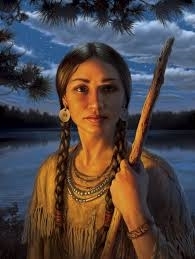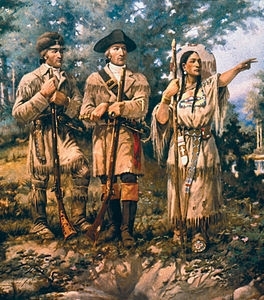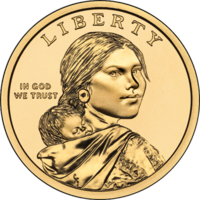 |
| Young Sacagawea2 (http://commons.marymount.edu) |
"A hero is an ordinary individual who finds the strength to persevere and endure in spite of overwhelming obstacles." ("Hero Quotes"). Sacagawea is a hero because despite just having a newborn baby and traveling over rough terrain and unknown areas which could have posing threats, she was selfless and brave and joined the Lewis and Clark expedition, sticking with it the whole way. Sacagawea was a Shoshone indian woman who lived from 1788 to 1812, and "traveled thousands of wilderness miles with the Lewis and Clark expedition (1804-06)." When Sacagawea was about twelve years old, "a Hidatsa raiding party captured her near the Missouri River's headwaters" around the year 1800. She was enslaved and taken to their camp, then was eventually "purchased by French Canadian fur trader Toussaint Charbonneau and became one of his plural wives" around 1804. (Jay H. Buckley). Sacagawea joined the Lewis and Clark expedition on November 4, 1804 and "At fort Mandan on February 11, 1805, Sacagawea gave birth to Jean-Baptiste Charbonneau." (Ward). Sacagawea died in 1812, shortly after giving birth to a daughter. She was twenty five years old when she passed on that December 22 at Fort Manuel. ("Sacagawea"). A hero should possess bravery and selflessness, and otherwise be an inspiration to people. Bravery is doing something even if it scares you, and selflessness is doing something for the benefit of someone else, even if it doesn't benefit you. Sacagawea is a hero because throughout her life and the Lewis and Clark expedition, she has shown exceptional bravery and selflessness.
 |
| Sacagawea with Lewis and Clark (Wikipedia) |
Sacagawea was a selfless person. There are many ways she's proved this, doing things she didn't need to just to benefit others is one. Sacagawea was the only women to join the Lewis and Clark expedition, and she came along as a guide and an interpreter. "In the winter of 1804-1805, Captains Meriwether Lewis and William Clark wintered at Fort Mandan on the Missouri River in what is today North Dakota, where they encountered Charbonneau and Sacagawea. Lewis and Clark had embarked from St. Louis in 1804 on an exploratory cross-country journey initiated by President Thomas Jefferson. Before leaving Fort Mandan in April 1805 to continue their westward journey, Lewis and Clark hired Charbonneau as an interpreter, requesting that he bring one of his Shoshone wives with him. Charbonneau brought Sacagawea, who had given birth to their son, Jean Baptiste, on 11 February 1805 at the fort; the infant became the youngest member of the expedition." (McBeth). Even though she had just given birth to a newborn baby and could have been at home taking care of him, and even though this was a long hard journey, Sacagawea was selfless and gave up her time and comfort for them. She had to travel thousands of miles with her baby on her back, finding enough food to keep herself healthy so she could give him milk. It would be hard to make it through something like that with a baby, and she was selfless to risk both of their lives for the expedition. True to what was expected, the journey was hard and there were many setbacks along the way. "After reaching the Pacific, Sacagawea returned with the rest of the Corps and her husband and son-having survived illness, flash floods, temperature extremes, food shortages, mosquito swarms and so much more-to their starting point, the Hidatsa-Mandan settlement, on August 14, 1806. For his service Charbonneau received 320 acres of land and $500.33; Sacagawea received no compensation." ("Sacagawea"). Even though she could have been in the comforts of her home caring for her newborn child, Sacagawea gave her time and risked both the life of her baby and herself to help the expedition, proving herself worthy of being called selfless. Even after enduring such hardships she gained nothing, not being paid or rewarded. But she walked away alive and happy with her son, and that was what mattered. That's what being selfless means. Sacagawea did and endured so much along the Lewis and Clark expedition, but still she got nothing in return. Being selfless, she didn't care, she was just happy to be with her family.
 |
| Sacagawea Dollar Coin (Wikipedia) |
Spread around her entire life were many obstacles that proved her bravery, and she showed herself to be selfless, doing things for other's benefits. When she was young, she was captured by a Hidatsa raiding party and sold to be a wife. Later she joined a dangerous expedition, accompanying Lewis and Clark's trek to scope out new land. She went through many hardships and took many risks, and in the end got nothing. "The bilingual Shoshone woman Sacagawea (c. 1788 - 1812) accompanied the Lewis and Clark Corps of Discovery expedition in 1805-06 from the northern plains through the Rocky Mountains to the Pacific Ocean and back. Her skills as a translator were invaluable, as was her intimate knowledge of some difficult terrain. Perhaps most significant was her calming presence on both the expeditioners and the Native Americans they encountered, who might have otherwise been hostile to the strangers. Remarkably, Sacagawea did it all while caring for the son she bore just two months before departing." ("Sacagawea"). Sacagawea accomplished so much she didn't even need to do. She traveled vast distance over hard terrain with a newborn baby on her back, spending her time for others. Even when things got tough she kept going on. Sacagawea is an inspiration to me because of the the hard work and time she put into helping others for the sake of it, being selfless and brave the whole way. Sacagawea is my hero because everywhere she went, and with everything that happened to her she remained selfless and brave, finding a way to overcome every obstacle she encountered. That's what a hero should be. "A hero is an ordinary individual who finds the strength to persevere and endure in spite of overwhelming obstacles." ("Hero Quotes"). Works Cited "Hero Quotes." BrainyQuote. Xplore, n.d. Web. 03 Feb. 2015. Jay H., Buckley. "Sacagawea." Britannica Biographies (2012): 1. Biography Reference Center. Web. 28 Jan. 2015. McBeth, Sally. "Sacagawea." American National Biography (2010): 1. Biography Reference Center. Web. 28 Jan. 2015 "Sacagawea." History.com. A&E Television Networks, 2015. Web. 27 Jan. 2015. http://www.history.com/topics/native-american-history/sacagawea Ward, Harry M., and Ward Harry M. "Sacagawea." Great Lives From History: The Nineteenth Century (2007): 1. Biography Reference Center. Web. 28 Jan. 2015.
Page created on 2/13/2015 12:00:00 AM
Last edited 2/13/2015 12:00:00 AM
